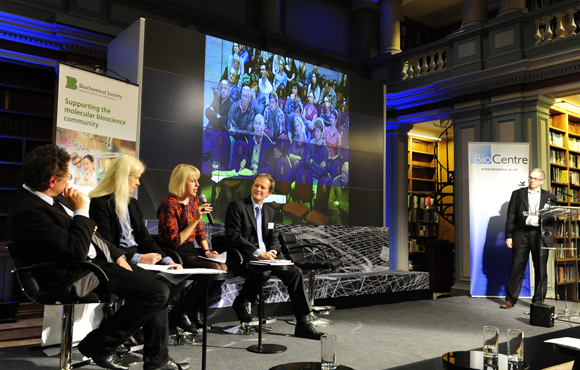About Us

Public discussion on synthetic biology held in partnership with BioCentre, Royal Society of Chemistry and the Biochemical Society, November 2012.
“Hosting the conversation”
BioCentre is a UK think–tank based in Westminster concerned with the ethical, social and political implications presented by new emerging technologies.
 BioCentre was originally established in 1984 in response to public concern over fresh challenges to ethics and policy resulting from emerging technologies. It was therefore one of the earlier centres active in the world of bioethics and biopolicy, and its first public event was a major conference convened to address the Warnock Report (which became the basis for UK policy on in vitro fertilisation and embryo research) shortly after its publication.
BioCentre was originally established in 1984 in response to public concern over fresh challenges to ethics and policy resulting from emerging technologies. It was therefore one of the earlier centres active in the world of bioethics and biopolicy, and its first public event was a major conference convened to address the Warnock Report (which became the basis for UK policy on in vitro fertilisation and embryo research) shortly after its publication.
Today, BioCentre is a think–tank which has a proven and successful track record in helping to host the conversation surrounding key issues in bioethics and emerging technologies through strategic conferences, symposia and publications.
In all that we do BioCentre’s vision is to capacity build for a ‘hyper–human future’; a future which embraces and celebrates future technologies at the same time as embracing what it means to be human. We want to see science research, medicine and public policy working together towards our common good as embodied human beings.
To realise this vision, BioCentre’s mission is to be recognised as the place which is ‘hosting the conversation’ concerning the major implications posed by emerging technologies as they impact upon the future of humanity.
In so doing by fostering a cross–disciplinary knowledge network BioCentre seeks to clarify and frame the key questions, providing informed opinion and advice on these advances.
Some BioCentre distinctives
[+] Thinking about the future….today
Very often the questions posed by new emerging technologies can be passed off as ample fodder for the science fiction community. However, as we speed up the exponential curve of Moore’s Law, its slope and our place on it may be debated but there is widespread consensus that the compounding character of our knowledge and its application through emerging technologies gets faster every day.
The result is that we must start thinking about and shaping the future today, otherwise the future will shape us.
[+] Asking the right question
Unlike most think tanks BioCentre is concerned as much about the conversation and how the questions are framed as it is about the answers.
It is our aim to bring together all articulate perspectives in order to establish a rich and diverse dialogue.
This includes perspectives regarded as ‘extreme’ in some cases, recognising that very often such viewpoints pose key questions which help provoke and provide new and creative angles to the conversation. We believe it is important not to marginalise or caricature too readily perspectives and ideas which may not fall by default within the common conversation.
We respect differences whilst seeking agreement on clarifying the key issues.
[+] Hosting the Conversation
BioCentre is committed to creating a context where rich, meaningful and fertile conversation can be engaged in order to generate fresh ideas and responses to these important questions.
[+] Cross disciplinary partnership
As BioCentre hosts the conversation and focuses on how the questions are framed, we recognise the need to draw upon all expertise and knowledge disciplines. Not one discipline or silo of expertise has all the answers.
[+] Values and ethics shaping policy
Values and ethics shape policy and strategic decision making.
Against the backdrop of life in the ‘global village’ there is a pressing need for a resurgence in innovation which can help find solutions to key problems with fewer resources.
Advances in fields such as information technology and biotechnology have already had profound effects on our lives as individuals and communities and look set to continue to do so. Coupled with this is the general agreement that the compounding effects of “emerging technologies” will radically re–shape the future of human society.
Crucial to this is the question of values and ethics which will shape how government, industry, and science go about making strategic long term decisions.
Good practice, trust and accountability are terms which have taken on new importance in recent years and with a growing shift towards collaboration, there is no better place for upholding these terms and linking up both technology and ethical foresight from the start.
.




